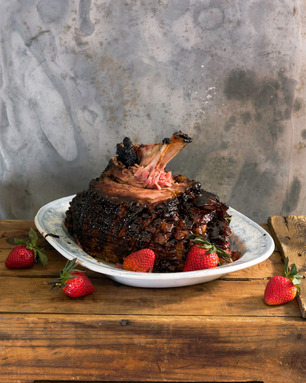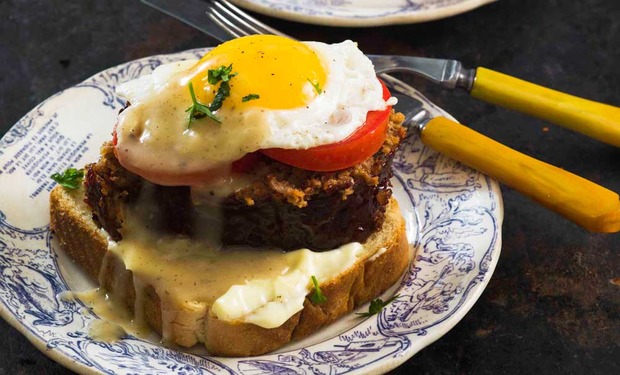Interview: Chef Edward Lee
Louisville’s rising chef on the cross-cultural appeal of smoke and pickles

by Stephen J. Pulvirent


You might remember Chef Edward Lee from his stint on Top Chef Texas, but that’s hardly the most interesting thing about him. The Brooklyn-born chef actually honed his skills in some tough New York kitchens before a road trip to the Kentucky Derby in 2001 ultimately led Lee to find his culinary home in Louisville and move there a year later.
Combining his Korean roots with fresh Southern ingredients and modern preparations has become Lee’s signature. His Louisville restaurant, 610 Magnolia, is described on the menu as “a modern approach to the Southern Table,” highlighting fresh produce and historically-inspired dishes. We spoke with Lee about his approach to cooking and his forthcoming cookbook “Smoke & Pickles.”

What are your earliest memories of cooking?
My earliest memories are watching my grandmother cooking in our small Brooklyn apartment. I was fascinated by her movements, the rhythm she had in her kitchen, the confidence she exuded in that little kitchen that created so much delicious food.
Are you a big cookbook user?
I collect antique cookbooks and read through all the latest stuff. I rarely cook from them though—to me they are like reading history books. I read them and catalog them in my head. Together, they shape the history of food that we are living through.
What do you miss from the New York City food scene? And what does Kentucky offer that New York doesn’t?
I miss getting a quick slice of reliable pizza, I miss the roast duck at Bo Ky in Chinatown, I miss Crif Dogs, I miss the pastrami salmon and the pickled herring at Russ and Daughters, I miss Senegalese food in Harlem, I miss rotisserie chicken from Astoria and Korean food from 32nd street. Other than that, I don’t miss much, except for the pig’s feet hot pot at Hakata Ton Ton and the cheese at Murray’s, and, oh well, I guess the list can go on and on. But here in Kentucky, you can get a proper plate of fried chicken—crusty, greasy, hot and salty. And a sublime plate of fried chicken makes you quickly forget all the rest.


What made you want to do a cookbook and how did you come up with Smoke & Pickles?
Everyone I meet always asks me, “How’d you end up in Kentucky?” This book started as the long answer to that question and evolved, like all projects do, into something more personal and more expressionist. I wanted to show something more than a set of recipes—an expression of the way I approach food, life and culture. The title “Smoke & Pickles” is, for me, the intersection where Southern and Korean cuisine meet. In both, you can’t serve smoked meats without pickles—it is simply the way both cuisines balance out flavors. I find that idea in and of itself to be mind blowing: that two cultures so far apart can have a cuisine that so closely mimics one another.
The title “Smoke & Pickles” highlights two preservation techniques—how do you see preservation fitting into the current movement towards fresh, seasonal eating?
Preservation has always been at the heart of agricultural cooking. It is historical and it is what gives meaning to the way we cook. In order to follow the rhythm of the seasons, we have to use preservation techniques. During harvest, we are inundated by an abundance of crops—it is the force of nature that tells us that it is now time to start preserving. It is in our DNA.
What other similarities do you see between Southern and Korean cooking?
I see smoke flavor and the love of pickles. I also see tenacious, stubborn people that refuse to let go of their history and tradition. I see the love for spice and the importance of gathering around the family table and also the joy of getting messy at the dinner table.


What is it like to write a cookbook in the age of online recipe books and websites?
I wanted to put my recipes in context. I wanted my cookbook to be a narrative: to have a beginning, a middle and an end. I don’t want my recipes to be plucked out of context and splashed onto a website (though I know some of them will be). It’s like listening to a Van Morrison song without listening to the whole of Astral Weeks—it’s nice but you don’t get the whole story until you sit in a quiet room and listen through the entirety of the album. I’d like for people to live with my book for awhile, for days, maybe even weeks, not the minutes that it takes to scroll through a website.
What is the one recipe from the book that you couldn’t live without?
Fried Chicken. It’s how I make it at home.
What is one great food to pickle that we’d never think of?
Grapes.
And one to smoke?
Milk.
If you had to choose, smoke or pickles?
That’s unfair. That’s like yin without the yang. That’s like peaches without cream. That’s like summer without baseball. You get the idea.
Smoke and Pickles: Recipes and Stories from a New Southern Kitchen is published by Artisan Books and will be available from May 1.
Images excerpted from Smoke & Pickles by Edward Lee (Artisan Books). Copyright © 2013. Photographs by Grant Cornett.












